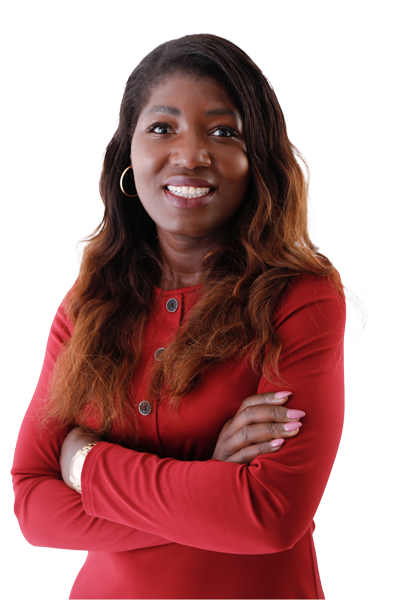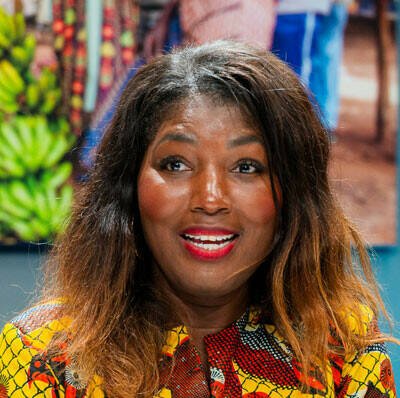
Men vs women
Two-way street
Internationally oriented
Núria Vlonk-Cunha Soares
NABC

Born in Guinea-Bissau, brought up in Portugal and the Netherlands, Núria Vlonk-Cunha Soares has grown up to be a very internationally oriented person. As the Deputy Managing Director at the Netherlands-African Business Council (NABC) she aims to bring Dutch and African companies together to create a better future for all parties involved. As a dedicated and ambitious woman in a field of work where men are still the majority, Núria hopes to inspire other women to use their full potential.





Born in Guinea-Bissau, brought up in Portugal and the Netherlands, Núria Vlonk-Cunha Soares has grown up to be a very internationally oriented person. As the Deputy Managing Director at the Netherlands-African Business Council (NABC) she aims to bring Dutch and African companies together to create a better future for all parties involved. As a dedicated and ambitious woman in a field of work where men are still the majority, Núria hopes to inspire other women to use their full potential.
Núria completed a bachelor International Business and Languages at Rotterdam Business School, followed by a masters International Development Studies at the Wageningen University & Research. “During my bachelor, I lived a year in Switzerland and 6 months in France. After my bachelor, I didn’t want to start working right away, so I decided to do a masters. And of course, that had to be in the same area: internationally oriented.” During her masters, Núria got the chance to travel to Mozambique to do her fieldwork there, which made her fall in love with the country. “Unfortunately, I couldn’t stay there so I went back to the Netherlands to work for the Netherlands Environmental Assessment Agency in de field of the international development goals, which are now called the sustainable development goals. That was interesting work, but when Wageningen University gave me the opportunity to work in Mozambique, of course I couldn’t say no and followed that path.”
Núria stayed in Mozambique for a year, where she developed a framework for sustainable investments, in particular in the field of renewable energy. When she returned to the Netherlands, she worked for various NGO’s, such as Oxfam Novib, and she also worked for other international companies that focused on international trading and business.
Internationally oriented
NABC
Through these interesting steps in her career, the NABC got her attention. “I already knew the organisation, because I worked at companies that were a member of the NABC. For example, I worked at OTC Organics, a company that imports organic vegetables and fruits from countries such as Senegal, Burkina Faso, Ivory Coast and Ghana. I was well connected with growers in those countries. I remember when I was in Burkina Faso during the mango season, I saw the work that is created by this kind of international business chains. Most of the employees at the packing stations were women, all working so hard to provide for themselves and children. I had become a mother not long ago. It touched me to see that we are all the same. We all want a better future for ourselves and especially for our children. Women often envision and consciously work towards the future. Moreover, they are often more aware that the current choices they make today will have a big impact on the future of those around them.
Two-way street
Núria has been with NABC three years now, and she couldn’t wish for a more suitable role for her. “It is not just like we help them because they can’t do it themselves, or something like that. On the contrary: we need each other. If you think about everything we import from countries in for example Africa, that is a wide variety. And we also export a lot, so it is a very important relationship, of which not everybody is conscious.”
Because of this two-way relationship, Núria emphasizes that is very important to make it clear that we are not in those countries with the idea that we know best and we are there to tell you how to work. “And it is also very culturally dependent how countries work and what the rules are. So you have to get to know a country and adjust constantly. So when new members join us, we always tell them that they should not expect that it all goes down naturally, the match can take long. But that is why we are there, to communicate between the parties involved.”
Men vs women
Núria (and NABC) often operate in sectors dominated by men. “A good example is the poultry and horticulture sector. Often decision-making positions are held by men. I often wonder what it would be like if there was more balance. That is very hard and I think will take a long time.” This is not only the case in countries on the other side of the world, emphasizes Núria. “It is a deep rooted idea in our society and that of a lot of other countries, that men hold the more important and influential positions, and women should be with their family and not be as career-driven as man. Women should take care of the children while men provide the income. Unfortunately, that is still the idea in a lot of countries. And that is not something that will change quickly.”
To change these deep-rooted ideas, Núria emphasizes how important it is to change existing structures. “For example Dutch companies can invest in women in African countries by creating a place of employment for them. That can be a position that may not seem that important at first sight, but has a big impact on the way women are treated and perceived and gives them the opportunity to develop themselves and their skills and provide their own income so they are not depending on men.” This applies not only to African countries, because women are also treated differently in the Netherlands, observes Núria. “When women have the ambition to get a higher position, they are treated differently from the men doing the same. When women make mistakes, they are viewed differently than when men make mistakes. And women have the tendency to say sorry for everything, when men wouldn’t even think twice. And another very important thing: women still earn less than men in the same position.”
According to Núria, it is important to know what you want and believe in yourself. “That is also something I tell my daughter: you will come across people who will underestimate you just because of your gender. Believing you can achieve your goals should come from within and not the other way around.” To get women like Núria’s daughter to believe in themselves, she thinks it is very important that women have role models and that they see what great things other women have achieved. “The more often young women see other women in key positions, the more normal it will get and the more they believe they can do the same. And then hopefully, equality will be the norm.”
Her family is strewn all over the world: from European countries such as Portugal, Spain and Belgium to her home country of Guinea-Bissau. Núria herself lived in Rotterdam most of her life. “We moved from our home country to Portugal when I was little, but after a few years we settled in Rotterdam and that is where I grew up. I went to my high school and college there and now I live in Utrecht with my husband and daughter.”
Núria Vlonk-Cunha Soares